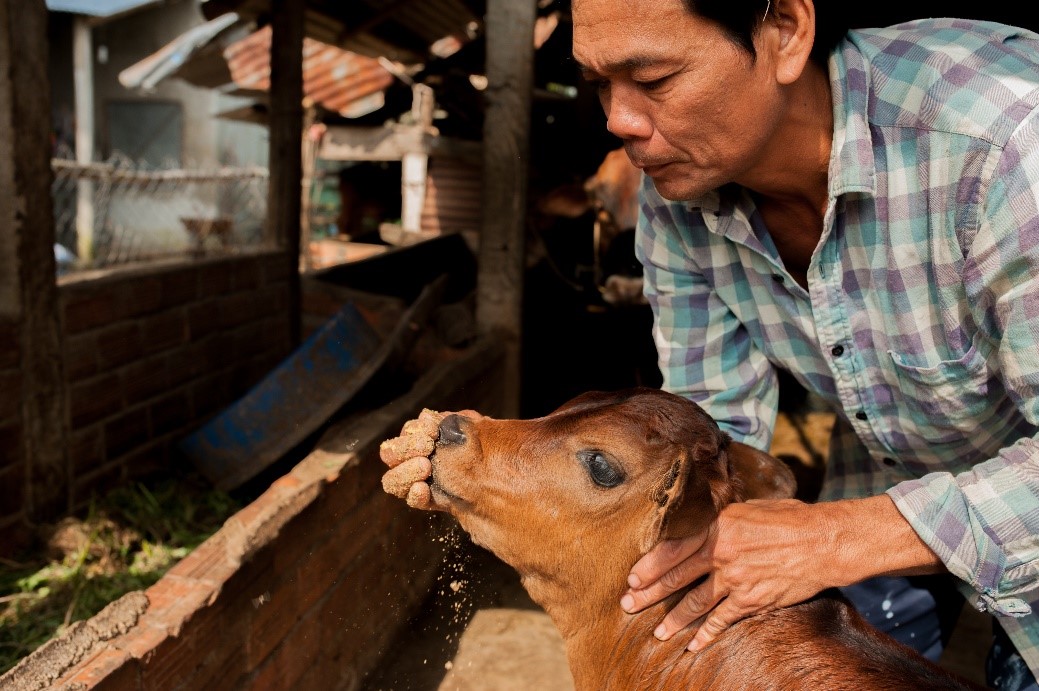
Feeding cattle. Photo: ACIAR Vietnam
Theme 1: Food safety
Research collaboration under this theme is expected to build on earlier projects with a focus on food safety, particularly in pork supply chains in Northern Vietnam, vegetable production (principally in Northern Vietnam) and improving the quality of fisheries products. Additional research opportunities are:
(i) Biocontrol methods for pests and diseases in horticulture and crops.
(ii) Assessing food safety risks and developing clean and safe meat supply chains.
(iii) Improved chemical use in vegetable production and supply chain management.
(iv) Improved biosecurity, including diagnosis and management of animal diseases, particularly zoonoses, and antimicrobial resistance.
(v) Analyses of policy interventions and possible regulatory reforms.
Theme 2: Climate change
Specific research under this theme could include:
(i) Breeding and selection for adaptation to biotic and abiotic stresses, including salt-tolerant varieties (e.g. rice), drought and heat-tolerant varieties (including fruit trees) and breeding of plantation tree species resistant to drought in the central coastal area of Vietnam.
(ii) Policy and economic analysis of opportunities for alternative crops and production systems in areas subject to sea level rise and saline intrusion.
(iii) Development of ‘low carbon’ technologies and practices to reduce greenhouse gases and maximise the effective exploitation of waste from crop and animal production and aquaculture.
(iv) Analysis of the economics of land-use change and adoption of new varieties and management practices, as well as of possible policy interventions.
(v) Filling animal feed gaps, particularly during winter in the Northern Highlands and the dry season in the Central Highlands and Mekong Delta.
Theme 3: Soil fertility and crop-livestock systems
Research collaboration under this theme will focus on improving soil health, developing biocontrol and integrated pest management practices, reducing costs of production and reducing post-harvest losses. Research may also focus on sustainable intensification of smallholder livestock production in crop-livestock systems, with a focus on cattle, goats and pigs.
Specific research under this theme could include:
(i) Developing better skills to analyse nutrient deficiencies in fruit and vegetables and developing appropriate solutions.
(ii) Improving the quality and value of temperate fruits.
(iii) Improving the quality and quantity of safe vegetables for both increasing provincial consumption (and increasing health and nutrition) and supply to major markets such as Hanoi and Ho Chi Minh City.
(iv) Improving the sustainability of cropping systems on sloping land (including animal feed and transition to perennial tree crops where appropriate).
(v) Improving the resource use efficiency and profitability of livestock production in crop–livestock systems in mountainous areas.
(vi) Improving plant nutrition and crop management for non-rice crops in the Mekong Delta.
(vii) Diagnosing and managing soil-borne diseases and reducing chemical inputs in intensive cropping systems in the Central Highlands (pepper, coffee).
(viii) Adding value to crop and animal production waste including use as fertilisers and soil conditioners.
(ix) Developing commercial medicinal plants and non-timber forest products.
(x) Improving the availability and sustainability of groundwater resources in intensive production areas.
(xi) Developing water-saving irrigation technologies to reduce production costs and reduce contamination of chemical fertilizers and pesticides.
(xii) Developing organic agriculture, organic fertilizer products and nano-fertilizers.
Theme 4: Market engagement
Research collaboration under this theme will enable emergence of inclusive agribusinesses by understanding global supply chains and how producers can cost-effectively meet the standards and market requirements for higher value markets. This will require enhanced animal and plant health, traceability and quality control to meet regional and international sanitary and phytosanitary requirements. It will also require a better understanding of the impacts of new regulatory regimes and macro or micro policies.
Specific research under this theme could include:
(i) The role and form of producer organisations, including improving their access to technology, finance, inputs and markets.
(ii) Improvement in agrifood value chains through understanding efficiencies and constraints to improving value and policies that provide incentives for increasing investment. Piloting value chains which has linkage with global value chains. Research towards application and synchronization of Vietnam's standards with the global standards.
(iii) Policies to support agricultural restructuring and analysis of factor markets (such as land, water and labour, capital and technology).
(iv) Regional market analysis for certain commodities where Vietnam has a particular opportunity, commencing with beef and cassava, vegetables, fruits, coffee and pork.
Theme 5: Forestry
Specific research under this theme will build on the well-established research cooperation and could include:
(i) Sustainable development of plantations, forest health and value-added processing.
(ii) Sustainable and economic rehabilitation and management of native forests.
(iii) Sustainable development of non-timber forest products.
(iv) Forest product marketing, to improve the utilisation for high value products.
(v) Sustainable agroforestry systems on sloping lands.
Theme 6: Aquaculture
Specific research under this theme could include:
(i) Developing genetic and breeding technologies, with potential target systems being shrimp (black tiger (monodon), white leg (vannamei) and freshwater), lobster, marine fish (especially pompano, grouper), bivalves, abalone, sea cucumbers and seaweeds.
(ii) Developing production technologies for sustainable production of seafood at small scale and low cost. Potential target systems include seaweed, pearl and sea cucumber.
(iii) Co-management of waterways and water rights.
(iv) Building better capacity for disease diagnostics and response.
(v) Monitoring, assessing and improving environment management in areas of intensive aquaculture production.
(vi) Developing novel and cost effective feeds for aquaculture.
